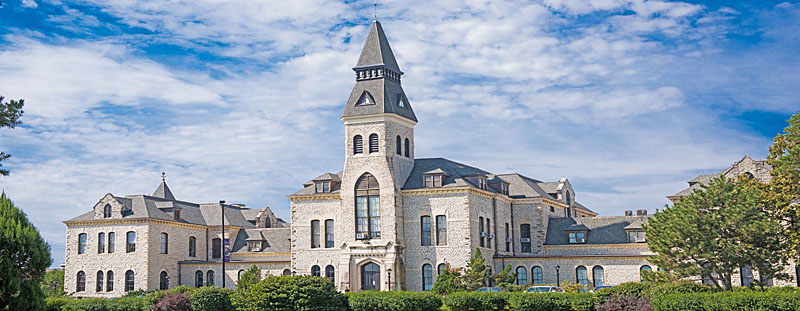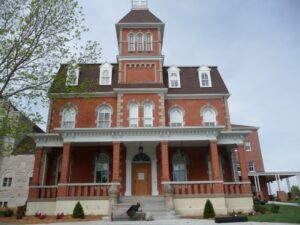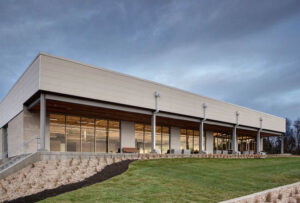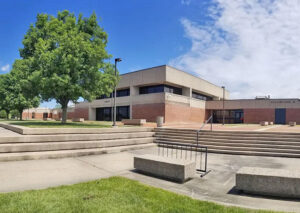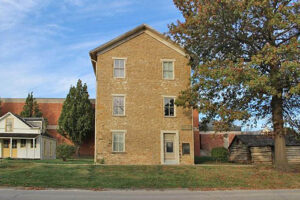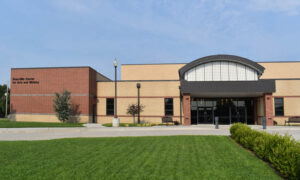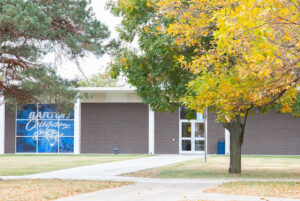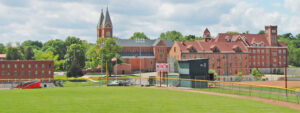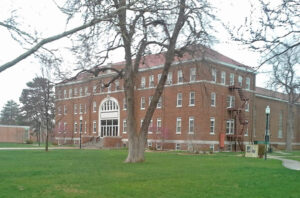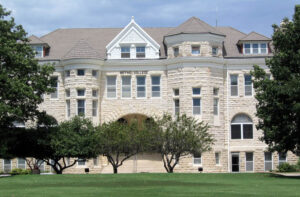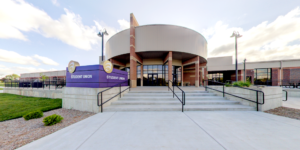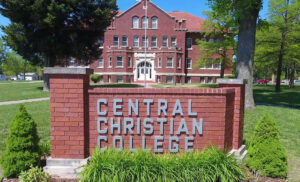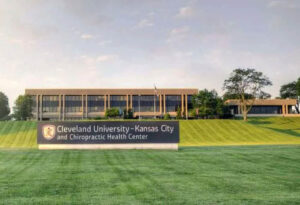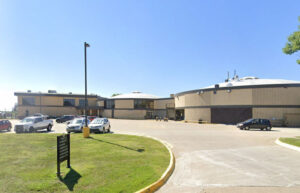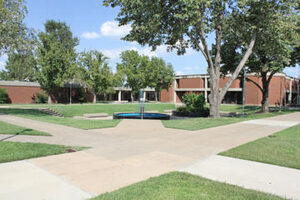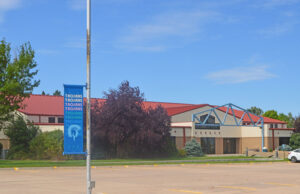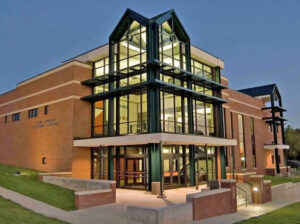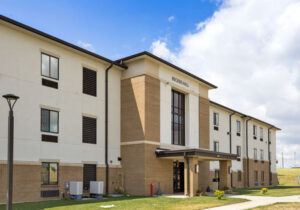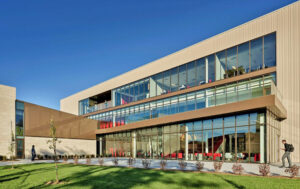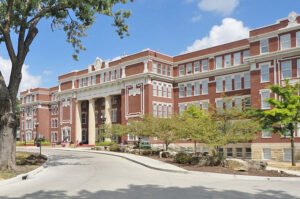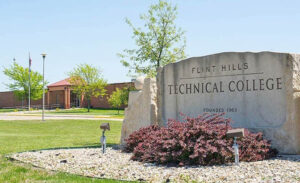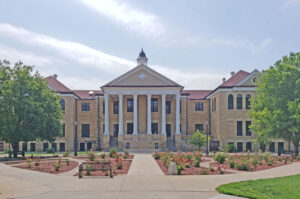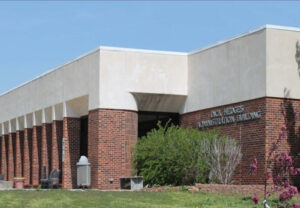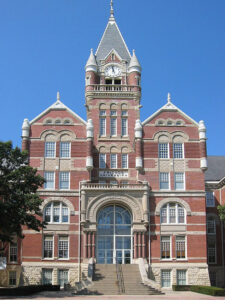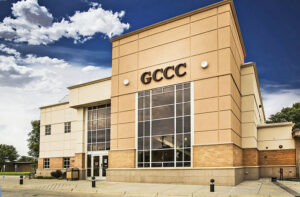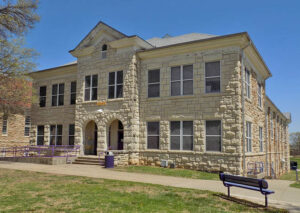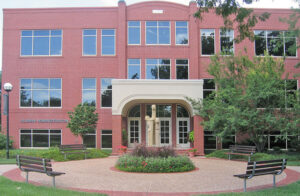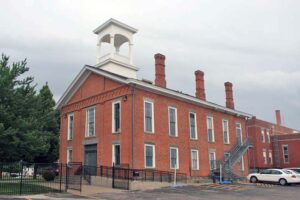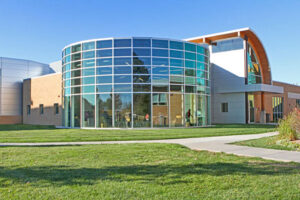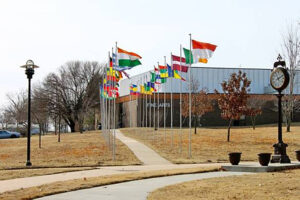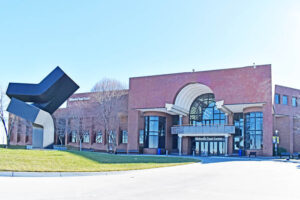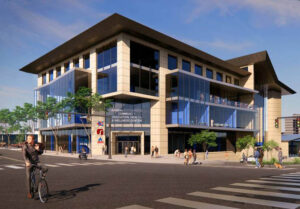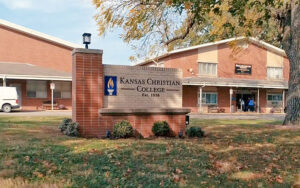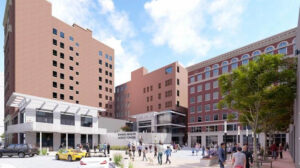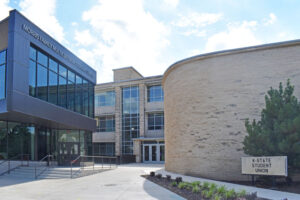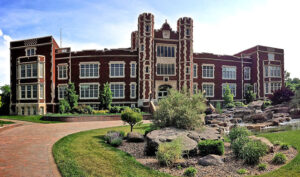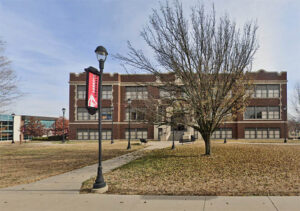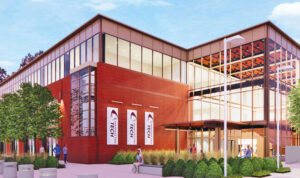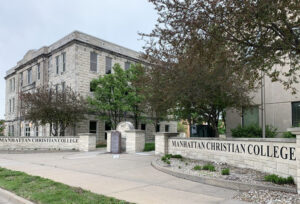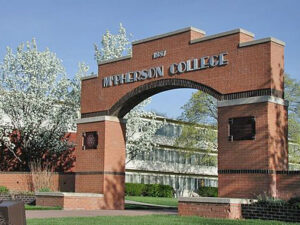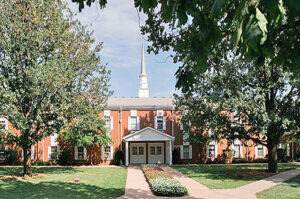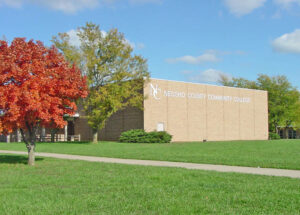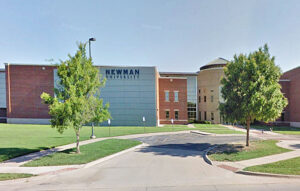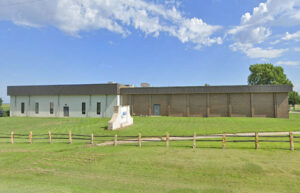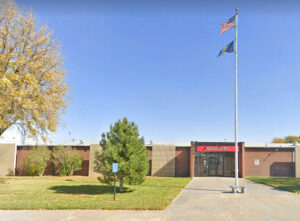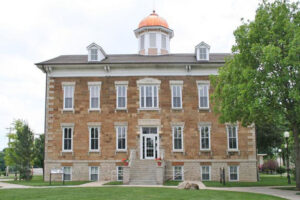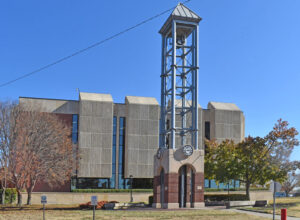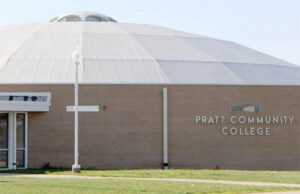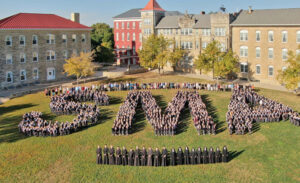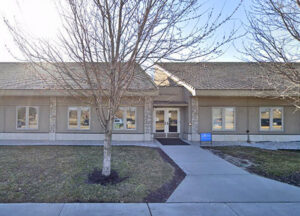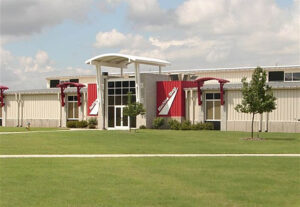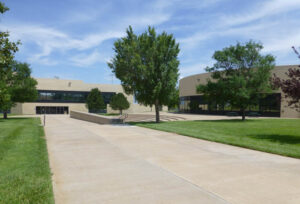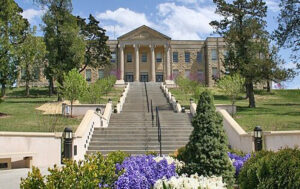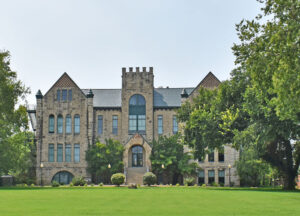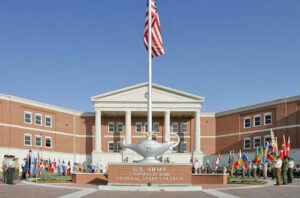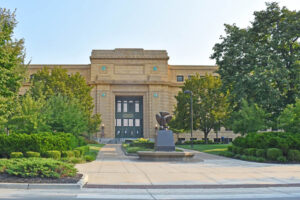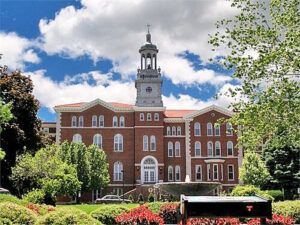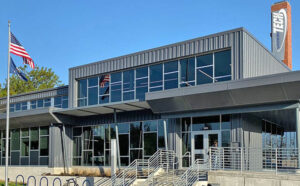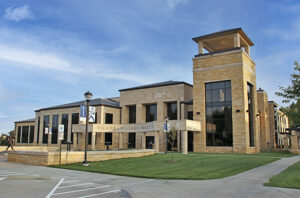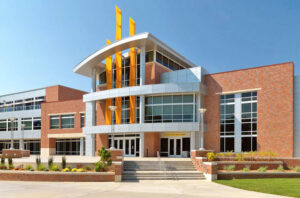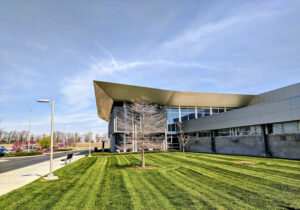| Name | Location | Type | Years | Information |
| Academy of Mount St. Scholastica | Atchison | Private | 1877-Present |
Price Villa, now called St. Cecilia’s, was constructed in 1872 for attorney and political figure John M. Price. Architect Thomas Wise and F.W. McLaughlin designed the three-story brick building in the Renaissance style with a Mansard roof and a four-story square tower. It has been a part of the Mount St. Scholastica Convent property since 1877. It was listed on the National Register of Historic Places in May 1972 as a good example of Italianate and Second Empire architecture. In 2003, Mount St. Scholastica Academy merged with the Benedictine monks’ Maur Hill Prep to become Maur Hill-Mount Academy. It is located at 801 S 8th Street in Atchison, Kansas. |
| AIB International | Manhattan | Technical School | 1919-Present |
The American Institute of Baking, now known as AIB International, was founded in 1919 as a technology and information transfer center for bakers and food processors. Staff includes experts in baking production, experimental baking, cereal science, nutrition, food safety, and hygiene. AIB is headquartered in Manhattan, Kansas. |
| Allen Community College | Iola and Burlingame | Community College | 1923-Present |
Allen Community College is a public community college with two campuses in Kansas: a main campus in Iola and a satellite campus in Burlingame. Allen offers both online and in-person courses for incoming students. Allen County College, formerly known as Allen County Community College, was established in 1923. The college’s original name was Iola Junior College, and it was part of District 10 under the jurisdiction of the Iola Public Schools Board of Education. As Iola’s population grew and there was only one high school for residents, an expansion was needed. The college was initially designed as an expansion, added onto the third floor of Iola High School. The addition was successful, and in the first year, enrollment reached 93 students. This new addition, Iola Junior College, remained a part of the high school for 42 years. In June 1965, the local Board of Education successfully petitioned the State Superintendent of Public Instruction to create a countywide community college. The petition was approved; therefore, Allen County Community Junior College is now an independent entity. The Burlingame Campus began operations in the spring of 1991 in a 7,500-square-foot building constructed through a cooperative venture among the City of Burlingame, the unified school district, and Allen Community College. |
| Baker University | Baldwin City | Private | 1858–Present |
Baker University in Baldwin City, Kansas, was founded in 1858 and named for Osman Cleander Baker, a Methodist Episcopal bishop and biblical scholar. It is the state’s oldest continuously operating institution of higher learning and the first four-year university in Kansas. Local donations and donors raised funds from the East. It is affiliated with the United Methodist Church. It comprises four schools — the College of Arts and Sciences and the undergraduate courses in the School of Education, located on the campus in Baldwin City; the School of Professional and Graduate Studies and the graduate branch of the School of Education serve nontraditional students on campuses in Overland Park, Kansas, and online and the School of Nursing, operated in partnership with Stormont Vail Health in Topeka, offers a Bachelor of Science in Nursing and an online Master of Science in Nursing. Enrollment across all four schools has grown to about 4,000 students, with about 900 on the Baldwin City campus. Old Castle Hall, built in 1857-58, was the original home of Baker University. It now houses a museum of the university and Baldwin City. Parmenter Hall is the most recognizable building on Baker’s main campus. |
| Barclay College | Haviland | Private | 1917-Present |
A Quaker college renowned for its ministry degrees, it also offers degrees in other professional fields. Since the fall of 2007, the college has offered full-tuition scholarships to students who enroll full-time and pay the cost of living in the residence halls. Formerly called the Central Bible Training School on the site of Haviland Friends Academy, a Quaker high school. A two-year junior college was added in 1925, and the name was changed to Friends Bible College in 1930. By 1968, emphasis shifted to four-year institutions, leading to the closure of the high school program and efforts to secure the necessary faculty and facilities. In 1975, it received general recognition with full accreditation from the Association for Biblical Higher Education. Barclay College was renamed in 1990 to honor Robert Barclay, the first Quaker theologian. |
| Barton Community College | Great Bend | Community College | 1965-Present |
Barton Community College, previously Barton County Community College, is a public community college in Great Bend, Kansas. It was founded on July 15, 1965, through a popular election in Barton County, Kansas. Its service area includes Barton, Ellsworth, Pawnee, Rush, and Russell Counties, Stafford County north of U.S. Highway 50, and northwestern Rice County.
|
| Benedictine College | Atchison | Private | 1971-Present |
Benedictine College was established in 1971 through the merger of St. Benedict’s College (founded in 1858) for men and Mount St. Scholastica College (founded in 1923) for women. It is located on bluffs overlooking the Missouri River northwest of Kansas City, Missouri. Benedictine is one of several U.S. Benedictine colleges sponsored by St. Benedict’s Abbey and Mount St. Scholastica Monastery. The abbey has 53 monks, while the Mount monastery has 147 community members. The college has built its core values around four “pillars”—Catholic, Benedictine, Liberal Arts, and Residential—that support the Benedictine College mission to educate men and women in a community of faith and scholarship. |
| Bethany College | Lindsborg | Private | 1881-Present |
This Christian college was founded in 1881, making it one of the oldest colleges in Kansas. Swedish Lutheran immigrants established it as a college of the Evangelical Lutheran Church in America. Swedish-Lutheran settlers worked with the Reverend Carl Aaron Swensson, pastor of Bethany Lutheran Church, to establish Bethany Academy on October 15, 1881, in the church’s sacristy in Lindsborg, Kansas, with ten students. |
| Bethel College | North Newton | Private | 1887-Present |
Bethel College is a private Christian college affiliated with the Mennonite Church. Founded in 1887, it is the oldest Mennonite college in North America. Bethel College became the second institution of higher learning affiliated with the General Conference Mennonite Church, replacing the Wadsworth Institute in Ohio, which closed in 1878. Bethel’s curriculum is based on a general education program in the liberal arts and sciences, designed for students with moderate to high academic ability. There are specific requirements for studying religion and engaging in cross-cultural experiences. The college offers majors in traditional liberal arts disciplines and selected career areas, including software development, biochemistry, and molecular biology. Additionally, it offers accredited professional programs in nursing, social work, and teacher education. |
| Butler Community College | El Dorado | Community College | 1927-Present |
Butler Community College is a public community college in El Dorado, Kansas. In 1927, El Dorado Junior College was founded. The college’s name has evolved over the years: from Butler County Junior College to Butler County Community Junior College, then to Butler County Community College, and finally to its current name, Butler Community College. There are several branch campuses in Andover, Council Grove, Marion, McConnell, and Rose Hill, as well as several distance-learning sites in local high schools. Butler is Kansas’s second-largest community college, with 13,000 students annually across six campus locations. Most are commuters. |
| Central Christian College | McPherson | Private | 1884-Present |
Central Christian College of Kansas is a private evangelical Christian college affiliated with the Free Methodist Church. It began as Orleans Seminary in Nebraska but, due to deteriorating facilities and declining enrollment, relocated to McPherson, Kansas, in 1914. The new school, Central Academy and College, offered both elementary and high school education. The college eventually added a junior college curriculum and, in 1918, was accredited by the Kansas Department of Education. In about 1939, its name was changed from Central Academy and College to Central College. In the 1950s, the name was changed again to Central College of the Free Methodist Church, and the college expanded to include a gymnasium, fine arts building, and a student center. The high school was eventually closed. In 1999, the college was renamed Central Christian College of Kansas, and in 2000, it was officially recognized as a four-year institution. It is the oldest accredited junior college in Kansas. |
| Cleveland University-Kansas City | Overland Park | Private | 1922-Present |
Cleveland University-Kansas City is a private university located in Overland Park, Kansas. It was founded in 1922 as the Central College of Chiropractic. The school’s founders were among the first families of chiropractic, including C.S. and Ruth Cleveland, and Perl B. Griffin. All three were graduates of Palmer College of Chiropractic. After two years, Central College of Chiropractic was renamed Cleveland Chiropractic College. It is known primarily for its chiropractic doctorate program, but it also offers associate, bachelor’s, and master’s degrees. The university has occupied its current 34-acre location in Overland Park, Kansas, since 2008. |
| Cloud County Community College | Concordia & Junction City | Community College | 1965-Present |
Cloud County Community College is a public community college with campuses in Concordia and Junction City, Kansas. The school was founded in Concordia in 1965, and classes began at the Concordia Junior-Senior High School. The college moved to its present site in 1968. The Geary County campus in Junction City opened in 1997. |
| Coffeyville Community College | Coffeyville | Community College | 1923-Present |
Coffeyville Community College is a public community college located in Coffeyville, Kansas. It was founded in 1923 and is among the first institutions chartered by the State of Kansas. The school was founded at the request of the voters of the Coffeyville school district to provide two years of college for students who had graduated from Coffeyville High School at that time. |
| Colby Community College | Colby | Community College | 1964-Present |
Colby Community College is a public community college in Colby, Kansas. Established in 1964, it has a 57-acre main campus in Colby with an additional 64-acre agricultural center east of the city. The college offers more than 60 academic options, culminating in Associate of Arts, Associate of Science, and Associate of Applied Science degrees, as well as certifications. Many programs and courses are offered in traditional and online learning environments. The school serves hundreds of off-campus students by offering classes in its 14-county service area, including a nursing campus in Norton, as well as through online courses. |
| Cowley College | Arkansas City | Community College | 1922-Present |
This public community college is in Arkansas City, Kansas. It also operates locations in nearby Wellington, Winfield, Mulvane, and Wichita. Cowley College held its first classes on September 11, 1922. At this point, it was known as Arkansas City Junior College and, like most junior colleges of the time, operated under the direction of the local school district. Classes were held on the top floor of the Arkansas City High School but were soon relocated to the basement, earning it the nickname “Basement University.” In 1936, a combination auditorium and gymnasium was built, and in 1952, the school held its first classes in a dedicated college building. In addition to an online presence, the college offers on-site courses at nine area high schools. The Higher Learning Commission accredits Cowley College. |
| Dodge City Community College | Dodge City | Community College | 1935-Present |
This public community college in Dodge City, Kansas, was founded in 1935. It was located on the third floor of the Senior High School Building at 1601 First Avenue for 22 years. By 1957, it had grown large enough to require a move to 1000 Second Avenue. The college remained there for the next 13 years. In 1965, the Kansas Legislature passed legislation changing control of the state’s junior colleges from the State Board of Education to locally elected Boards. At that time, Kansas junior colleges became genuine community colleges, answerable to the citizens in their areas. Ford County voted overwhelmingly to assume responsibility for the college, and in the fall of 1965, the county elected its first board of trustees. In October 1966, due to overcrowded classrooms and the increasing need for additional occupational programs, the citizens of Ford County endorsed a $2.5 million bond. In 1970, a third version of the school opened its 35th year of operation with a new campus located on the city’s northwest edge. |
| Donnelly College | Kansas City | Private | 1949-Present |
In 1949, Donnelly College, a ministry of the Academy of Mount St. Scholastica, opened in Kansas City, Kansas. It still operates today at 608 N. 18th Street, conferring Associate and Bachelor’s degrees and offering nursing programs and certificates in business and information technology. |
| Emporia State University | Emporia | Public State | 1863-Present |
Emporia State University is a public university in Emporia, Kansas. It was established in March 1863 as the Kansas State Normal School. In 1923, it became the Kansas State Teachers College, and the name was changed to Emporia Kansas State College in 1974. In 1977, it became Emporia State University. The university offers degrees through seven schools, one college, and one institute: the School of Business and Technology, the School of Humanities and Social Sciences, the School of Library and Information Management, the School of Science and Mathematics, the School of Visual and Performing Arts, and the School of Applied Health Sciences. Emporia State is the third-oldest public university in Kansas. |
| Flint Hills Technical College | Emporia | Technical School | 1963-Present |
Flint Hills Technical College is a public community college in Emporia, Kansas. It was founded in 1963 by the Emporia School District. In 1999, it was transferred to the Kansas Board of Regents and separated from the Emporia School District in 2004. It is overseen by a board of trustees, which is responsible for its development and operation. Its programs include the Arts, Health, Industry Technology, Information Technology, and Applied Technologies. |
| Fort Hays State University | Hays | Public State | 1902-Present |
Fort Hays State University is a public university in Hays, Kansas. It is the largest university in western Kansas and the fourth-largest of the six state universities governed by the Kansas Board of Regents, with a total enrollment of approximately 15,100 students. It was founded in 1902 as the Western Branch of Kansas State Normal School, now called Emporia State University. The institution was initially located on the grounds of Fort Hays, a frontier military outpost that closed in 1889. The university served the early settlers’ needs for educational facilities in the new region. The first building, closer to Hays, was completed in 1904, when the university moved to its present location. It was initially founded as an agricultural school and later designated a regular school. The main campus is 200 acres and includes more than 40 limestone-faced buildings. The campus is just west of the Hays business district, two miles south of Interstate 70. |
| Fort Scott Community College | Fort Scott | Community College | 1919-Present |
This public community college in Fort Scott, Kansas, is the oldest in Kansas, founded in 1919. Highland Community College is older, but was not founded as a junior college. The main campus is located in Fort Scott. Still, there are satellite locations in other cities within Crawford County, including Pittsburg and Frontenac, as well as sites in Paola and Hillsdale, Kansas. It offers associate degrees, certificates, and technical education. The college has 2000 students. |
| Friends University | Wichita | Private | 1898-Present |
Friends University is a private, nondenominational Christian university founded in 1898. The main building was built in 1886 for Garfield University, but was donated in 1898 to the Religious Society of Friends (Quakers). In the 1930s, the school’s leadership was transferred to an independent board of trustees that included representation from the Mid-America Yearly Meeting of Friends. It operates today with “an amicable but independent relationship with the Society of Friends evangelical branch.” |
| Garden City Community College | Garden City | Community College | 1919-Present |
This public community college in Garden City, Kansas, was established in 1919 to provide post-secondary education opportunities for area residents. It was created by a countywide election on April 1, 1919, and opened in September of the same year. The school initially shared facilities in Sabine Hall and Calkins Hall, located in the 100 block of Buffalo Jones Avenue, with Garden City High School and opened with a first class of fewer than three dozen students. The college relocated to the newly constructed Garden City High School building in 1954. The Kansas Legislature passed the Community College Act in 1965, authorizing the establishment of 22 independent colleges, including Garden City Community College. Today, it is one of 19 community colleges in Kansas. |
| Haskell Indian Nations University | Lawrence | Federal | 1884-Present |
Haskell Indian Nations University is a public tribal land-grant university in Lawrence, Kansas. Founded in 1884 as a residential boarding school for Native American children of federally recognized Native American tribes in the United States. When Haskell opened in 1884, it was called the United States Indian Industrial Training School. It had 22 elementary-school-age students in its first year. In 1887, the school was renamed Haskell Institute in honor of Dudley Haskell, the U.S. representative from Kansas’s 2nd district who had worked to build the school in Lawrence. In the early 20th century, Haskell continued to evolve, adding classes for upper grades, and in 1927, it received accreditation as a Kansas high school. By 1935, it was classified as a vocational-technical school. With the expansion of its curriculum, the institution was renamed Haskell Indian Junior College in 1967 and began awarding associate degrees and certificates in specialized skills programs. By the late 1980s, planning began to develop the institution into a four-year, bachelor’s-degree-granting university. In 1993, the institution expanded its curricula and programs and was renamed Haskell Indian Nations University. Initially, Haskell offered its first four-year baccalaureate program in elementary teacher education. Within a few years, Haskell had developed its own specialized bachelor’s degree program in American Indian Studies. Business Administration and Environmental Sciences degree programs soon followed. Operated by the U.S. Bureau of Indian Affairs, it offers associate and baccalaureate degrees. Approximately 140 Tribal nations and Alaska Native communities are represented at Haskell. While the school does not charge tuition, students are responsible for paying yearly fees. Twelve campus buildings have been designated as U.S. National Historic Landmarks. It is the oldest continually operating federal school for American Indians. |
| Hesston College | Hesston | Private | 1909-Present |
Hesston College is a private college in Hesston, Kansas, associated with the Mennonite Church. In 1909, the Mennonite Church founded the college because many early local settlers were Mennonite farmers. It has approximately 400 students, who typically come from 30 states and 15 other countries. |
| Highland Community College | Highland | Community College | 1857-Present |
This school was established in 1837 for the Sac and Fox Nation under the Presbyterian Church in Highland, Kansas. In the late 19th century, the noted scientist, botanist, educator, and inventor George Washington Carver was accepted at Highland College. When he arrived, however, they refused to let him attend because of his race. Highland University was founded in November 1857 as the Presbyterian Academy. By December, the board had voted to establish Highland University in place of the academy, thereby fulfilling the founders’ goal of creating an educational and religious center for the new territories. In 1858, it became Highland University; in 1910, it was renamed Highland College. It was renamed Northeast Kansas Junior College in 1922, became Highland Public Junior College in 1937, Doniphan County Junior College in 1959, and Highland Community Junior College in 1965. The college considers Highland University the precursor to Highland Community College, making it the first college in Kansas. |
| Hutchinson Community College | Hutchinson | Community College | 1928-Present |
This public community college in Hutchinson, Kansas, was established in the spring of 1928 as Hutchinson Junior College and held its first classes that fall. On July 1, 1965, the name was changed to Hutchinson Community Junior College, and in 1980, to Hutchinson Community College. On July 1, 1993, it was renamed Hutchinson Community College and Area Vocational School after a merger with the local vocational school. In 2012, the vocational school addition was removed, and the institution was finally renamed Hutchinson Community College. The main campus is in Hutchinson, with two satellite locations in McPherson and Newton, Kansas. Students can choose from more than 70 academic programs, leading to Associate in Arts and Associate in Science degrees. Hutchinson Community College has transfer and articulation agreements with all Kansas Regents universities and colleges, as well as with a variety of other institutions nationwide. It also offers over 50 technical programs. It serves nearly 5,000 credit students every semester. |
| Independence Community College | Independence | Community College | 1925-Present |
This public community college in Independence, Kansas, was formerly Independence Community Junior College. It was established in 1925 as grades 13 and 14 of the Independence public school system. In 1967, Independence Community College was legally separated from the school district. Construction of the new community college on a 68-acre campus began in 1969. Classes at the new site began in September 1970. The campus is now home to the Academic Building, Fine Arts Building, Student Union, Center for Innovation and Entrepreneurship, Field House, Administration Building, William Inge Center for the Arts, fitness center, athletic practice fields, disc golf course, 96-bed multi-structure living complex, a 200-bed residence hall, and a 135-bed suite-style residence hall. In 2010, a former ample retail space was donated next to the local Walmart. The campus is located on the west side of Independence and offers programs in Allied Health, Cosmetology, Veterinary Technology, and Culinary Arts. |
| Johnson County Community College | Overland Park | Community College | 1972-Present |
This public community college in Overland Park, Kansas, in Johnson County, was established in 1972. In 1963, the Johnson County Commissioners, recognizing the emerging community college movement and seeking to accommodate the rapidly growing population, formed a committee to assess the feasibility of establishing a community college in the county. The college was formally established following a successful countywide election held in March 1967. The existing campus was established in 1969, following Johnson County voters’ approval of $12.9 million in bonds to purchase 200 acres of land in Overland Park. Construction began in 1970, and classes and operations were moved to the new campus in the fall of 1972. The school offers a range of undergraduate credit courses. Over 50 one- and two-year career degree and certificate programs prepare students to enter the job market in high-employment fields or transfer to a university. Class size averages 25 to 30 students. |
| Kansas City Community College | Kansas City | Community College | 1923-Present |
This public two-year community college is in Wyandotte County, Kansas, and was founded in 1923 as part of the Kansas City Public School System. In 1965, legislation governing two-year colleges in Kansas changed the college’s name to Kansas City, Kansas Junior College. In 1979, legislative action led to another name change for the state’s two-year colleges. The term “junior” was dropped from their names and replaced with “community”; at this time, the college officially became known as Kansas City Kansas Community College. |
| Kansas Christian College | Overland Park | Private | 1938-Present |
Kansas Christian College is a private, four-year Christian college affiliated with the Church of God (Holiness). The Association for Biblical Higher Education accredited the college, a commission recognized by the United States Department of Education. The college was founded in 1938 at 29th and Askew in Kansas City, Missouri, in the basement of the Church of God (Holiness), a denomination with Methodist Episcopal Church origins. It was initially known as Kansas City Bible School. In 1941, school officials purchased the 12-acre campus of the Uhls Sanitarium in southern Johnson County, Kansas, and renamed the school Kansas City College and Bible School. In 1947, a new chapel and classroom building was built, and the school added a grade school classroom in 1959 to accommodate what is now Overland Christian Schools. In 1965, three additional buildings were constructed, including a large gymnasium, a two-story classroom building, and a three-level dorm and dining area. It is located at 7401 Metcalf Avenue in Overland Park, Kansas. The sports program associated with Kansas Christian College is the Falcons. |
| Kansas Health Science Center-Kansas College of Osteopathic Medicine | Wichita | Private | 2022-Present |
The Kansas Health Science Center is home to the Kansas College of Osteopathic Medicine, a school within the center. In December 2021, the Commission on Osteopathic College Accreditation approved the college to begin recruiting students. The inaugural class was accepted for the 2022–23 academic year. |
| Kansas State University | Manhattan | Public State | 1863-Present |
Kansas State University is a public land-grant research university with its main campus in Manhattan, Kansas. It was opened as the state’s land-grant college in 1863 and was Kansas’s first public institution of higher learning. It was first called Kansas State Agricultural College. In 1931, its name was changed to Kansas State College of Agriculture and Applied Science, and in 1959, it took its present name. It had a record-high enrollment of 24,766 students for the Fall 2014 semester. Kansas State’s academic offerings are administered through nine colleges, including the College of Veterinary Medicine and the College of Technology and Aviation in Salina. Graduate degrees offered include 65 master’s degree programs and 45 doctoral degrees. Branch campuses are in Salina and Olathe. The Kansas State University Salina Aerospace and Technology Campus is home to the College of Technology and Aviation. The Olathe Innovation Campus focuses on graduate work in research bioenergy, animal health, plant science, and food safety and security. |
| Kansas Wesleyan University | Salina | Private | 1886-Present |
Kansas Wesleyan University is a private Christian university in Salina, Kansas. Founded in 1886, it is affiliated with the United Methodist Church. The university’s academic program offers a liberal arts foundation comprising more than 27 programs and awards degrees in MBA, BA, BS, and BSN. Additionally, the university offers online degrees in emergency management, criminal justice, and the Master of Business Administration. The average class size is 16 students, with a student-to-teacher ratio of 11:1. |
| Labette Community College | Parsons | Community College | 1923-Present |
This public community college in Parsons, Kansas, was established in the fall of 1923 as Parsons Junior College. It was initially financed and operated as part of Parsons Public Schools, serving as a two-year extension of the Senior High School. Until 1935, the college operated as a two-year institution and served as a stepping stone for students seeking to continue their education at a four-year university. In 1935, however, Parsons’s schools were reorganized. Under this new system, the Junior College was a four-year institution that instructed students in grades eleven, twelve, thirteen, and fourteen. In 1967, Parsons Junior College was renamed Labette Community Junior College. It retained this name until 1980, when it was renamed Labette Community College. The main campus is in Parsons, with satellite campuses in Cherokee, Oswego, and Pittsburg. |
| Manhattan Area Technical College | Manhattan | Technical School | 1965-Present |
This public technical college in Manhattan, Kansas, was founded in 1965. It offers Associate of Applied Science degrees in eight disciplines and technical certificate programs in several others. Initially, it was called the Manhattan Area Vocational Technical School, with classes held on the Manhattan High School campus until the current campus was completed in 1967. The school was renamed Manhattan Area Technical Center in 1992 and again changed to its current name in 1996, following the passage of legislation in 1994 that allowed vocational-technical schools to apply for recognition as colleges. In 2004, MATC separated from the USD 383 and became an independent public institution. |
| Manhattan Christian College | Manhattan | Private | 1927-Present |
Manhattan Christian College was founded in 1927 as Christian Workers University. The institution’s name was changed to Manhattan Bible College in 1930 and to Manhattan Christian College in 1971. It has historically been affiliated with nondenominational, independent Christian churches and with churches of Christ of the Restoration Movement. Students from various denominational backgrounds are encouraged and welcomed. Study programs include single- and dual-degree programs, in collaboration with Kansas State University, as well as adult degree-completion programs offered both on campus and online. The college offers Bachelor of Arts or Science degrees in various ministerial fields. The college also offers these two degree-completion programs through online distance education. Students may also pursue a two-year associate degree or obtain a one-year certificate. |
| McPherson College | McPherson | Private | 1888-Present |
McPherson College, located in McPherson, Kansas, was chartered in August 1887 by German Baptist Brethren church leaders who recognized the need for a college west of the Mississippi River to meet the educational needs of settlers moving westward. |
| MidAmerica Nazarene University | Olathe | Private | 1966-Present |
Mid-America Nazarene University is a private Nazarene university established in Olathe, Kansas, in 1966. In 1996, Mid-America Nazarene College formally changed its name to MidAmerica Nazarene University. Robert R. Osborne, a retired banker, donated the land for the 105-acre campus. It offers undergraduate degrees in more than 50 majors and seven graduate degrees in nursing, counseling, education, and business. In 2023, the university had 1,500 students. |
| Neosho County Community College | Chanute and Ottawa | Community College | 1936-Present |
Neosho County Community College is a public community college in Chanute, Kansas. It has a secondary campus in Ottawa, Kansas. In 1936, it was established as Chanute Junior College. On July 1, 1965, it was renamed Neosho County Community Junior College. The Ottawa campus was established in 1991. The Chanute Campus offers students the option to live on campus and participate in a meal plan. This campus is better suited to full-time traditional students. The Ottawa campus has no housing available. This campus is better suited to part-time, nontraditional students. |
| Newman University | Wichita | Private | 1933-Present |
This is a private Roman Catholic university in Wichita, Kansas. It is named after Saint John Henry Newman and was founded by the Adorers of the Blood of Christ as Sacred Heart Junior College in 1933. Courses were offered to women only, initially in home economics, nursing, teaching, and secretarial science. In 1950, the college became a four-year institution and was renamed Sacred Heart College. The college then added more facilities and courses and began accepting male students on a limited basis in 1958, in the evenings and during the summer. The school became fully coeducational in 1965 and was accredited by the North Central Association of Colleges and Secondary Schools in 1967. The school’s name was changed to Kansas Newman College in 1973 and Newman University in 1998. |
| North Central Kansas Technical College | Beloit and Hays | Technical School | 1964-Present |
North Central Kansas Technical College is a public technical school in Beloit, Kansas. Established in 1964, it was initially known as the North Central Kansas Area Vocational-Technical School. It offers programs in business, technology, carpentry, electrical, welding, health, and more. A second campus is in Hays, Kansas. |
| Northwest Kansas Technical College | Goodland | Technical School | 1964-Present |
Northwest Kansas Technical College is a public technical college in Goodland, Kansas. The college began in 1964 as the Northwest Kansas Area Vocational Technical School. In 2001, the name was changed to Northwest Kansas Technical College. The college offers 14 different programs ranging from diesel technology to medical assistant. The college also offers certificates and associate degrees. |
| Ottawa University | Ottawa | Private | 1865-Present |
Ottawa University is a private Baptist university with its main campus in Ottawa, Kansas. It also has a second residential campus in Surprise, Arizona, as well as adult campuses in the Kansas City, Phoenix, and Milwaukee metropolitan areas. It was founded in 1865 and is affiliated with the Ottawa Tribe of Oklahoma and the American Baptist Churches. The origins of Ottawa University date back to the 1860s, when Baptist missionaries established the First Baptist Church in the area that would eventually become Ottawa. The Potawatomi and Odawa peoples predominantly occupied it. At the 1860 Baptist State Convention in Atchison, Kansas, Reverend John Tecumseh “Tauy” Jones (Chippewa) argued for the university to be founded in Ottawa. He proposed that the Baptists work with Native Americans in the area, who might be willing to sell some of their land to create a college. Jones was an interpreter and influential among tribal leaders. The residential campus in Ottawa has more than 850 students enrolled, while the Arizona campus has more than 900. In total, Ottawa University serves over 4,000 students across all its campuses and online. |
| Pittsburg State University | Pittsburg | Public State | 1903-Present |
Pittsburg State University is a public university in Pittsburg, Kansas, United States. It enrolls approximately 7,400 students and is a member of the Kansas Board of Regents. It was founded in 1903 as the Auxiliary Manual Training Normal School, originally a branch of the State Normal School of Emporia (now Emporia State University). In 1913, it became a full-fledged four-year institution as Kansas State Teachers College of Pittsburg. Over the next four decades, its mission was broadened beyond teacher training. To reflect this, in 1959, its name was changed again to Kansas State College of Pittsburg. It became Pittsburg State University in April 1977. |
| Pratt Community College | Pratt | Community College | 1938-Present |
Pratt Community College is a public community college in Pratt, Kansas. Established in 1938, it is committed to maximizing student learning, individual and workforce development, high-quality instruction and service, and community enrichment. The college offers opportunities to participate in music, arts, athletics, service, and leadership. The official mascot for Pratt Community College is the Beaver. |
| Saint Mary’s Academy and College | St. Marys | Private | 1978-Present |
This is a religious school of the Society of St. Pius X located in St. Mary’s, Kansas. The original college at this location, St. Mary’s College, was founded by the Jesuits in 1848 as an Indian mission. The school is the site of the first cathedral west of the Missouri River and East of the Rocky Mountains. When the Potawatomi left, the Jesuits converted it into a boarding school for boys, which remained open until it closed during the Great Depression. After 1931, the 465-acre plot hosted the divinity school of St. Louis University. After seminaries relocated to the city following Vatican II, the land was sold, and the Jesuit divinity school returned to St. Louis in 1967. In 1978, the Society of Saint Pius X acquired the property along with 12 significant buildings. It has no ties with the previous St. Mary’s College. |
| Saint Paul School of Theology | Leawood | Private | 1958-Present |
This is a United Methodist seminary in Leawood, Kansas. The campus partners with the United Methodist Church of the Resurrection to serve the Greater Kansas City Metro Area. The student body comprises almost equal numbers of men and women, representing a diverse range of states and countries. Several other denominations are represented in the student body each year. The seminary was chartered in 1958, and the first group of fifty students began classes in 1959. The General Conference of the Methodist Church selected the Kansas City area due to a shortage of Methodist pastors in the Midwest. The school is focused on both intellectual pursuits and practical applications. Learning at Saint Paul occurs in the classroom, the church, the pulpit, and the real world. The curriculum combines academic study and experience and serves as a model for other seminaries. |
| Salina Area Technical College | Salina | Technical School | -Present |
Salina Area Technical College is a public technical college in Salina, Kansas. Established in 1965, it offers associate degrees, diplomas, and certificates. It opened on the former Schilling Air Force Base with 189 students enrolled in nine programs. From 1965 to 2008, Salina Tech was known as the Salina Area Vocational Technical School and was part of the Salina School District. In 2008, it became an independent technical college. In November 2016, the college was accredited by the Higher Learning Commission. |
| Seward County Community College | Liberal | Community College | 1969-Present |
Seward County Community College is a public community college in Liberal, Kansas. Established on December 29, 1967, it officially began classes on September 2, 1969. For the 2008–2009 academic year, Seward County Community College merged with Southwest Technical School to become Seward County Community College/Area Technical School. The name changed again in 2016 when the institution became Seward County Community College. The college retained the technical school programs and facilities as an academic division of the larger organization. The school’s academics are divided into five divisions: Allied Health; Industrial Technology; Agriculture, Business, and Personal Services; Humanities and Social Sciences; and Science, Math, and Pysical Education. The academic divisions collectively offer 40 majors. The Allied Health Division offers programs in nursing, surgical technology, laboratory technology, and respiratory therapy. |
| Southwestern College | Winfield | Private | 1886-Present |
Southwestern College is a private Methodist college founded in 1885 as Southwest Kansas Conference College. Initial plans called for establishing a school with academic departments in business, music, and art. Construction of the main college building began in the fall of 1885, with the four-story building anticipated to be ready for occupancy on September 1, 1886. Dormitory cottages were also to be built. The total construction cost was projected to be $60,000. In April 1886, Dr. John E. Earp became the first president of the Southwest Kansas Conference College. Upon completion of the main building, it was described in the local press as “one of the finest buildings in the state.” The college graduated its first class of three students on June 3, 1889. In 1909, the name was changed to Southwestern College. The school’s professional studies programs are designed for working adults and focus on degree completion. Six professional studies sites across three states allow students to earn bachelor’s degrees and select master’s programs in either a traditional classroom setting or online. The main campus is a laptop learning community, with laptop computers provided to all incoming students. An emphasis on service learning has led to the development of nationally recognized leadership, discipleship, and sustainability programs. In addition to bachelor’s degrees, several master’s programs allow undergraduate students to complete a graduate degree. Its doctoral degree in education began in the summer of 2012. |
| Sterling College | Sterling | Private | 1887-Present |
Sterling College is a private evangelical Christian college founded in 1887 by the United Presbyterian Church of North America as Cooper Memorial College. It changed its name to Sterling in 1920. The 1887 Cooper Hall building is a centerpiece of the campus. It was added to the National Register of Historic Places in 1974. |
| Tabor College | Hillsboro | Private | 1908-Present |
Tabor College is a private Mennonite college in Hillsboro, Kansas. Founded in 1908, it is owned and operated by the U.S. Conference of Mennonite Brethren Churches and adheres to Anabaptist doctrine. |
| United States Army Command and General Staff College | Fort Leavenworth | Military | 1881-Present |
The United States Army Command and General Staff College at Fort Leavenworth, Kansas, is a graduate school for United States Army and sister service officers, interagency representatives, and international military officers. The college was established in 1881 by William Tecumseh Sherman as the School of Application for Infantry and Cavalry (later simply the Infantry and Cavalry School), a training school for infantry and cavalry officers. In 1907, it changed its title to the School of the Line. The curriculum expanded throughout World War I, World War II, the Korean War, and the Vietnam War, and continues to adapt to include lessons learned from current conflicts. In addition to the main campus at Fort Leavenworth, the college has satellite campuses at Fort Belvoir, Virginia; Fort Gregg-Adams, Virginia; Fort Eisenhower, Georgia; and Redstone Arsenal, Alabama. The college also offers distance learning for some courses. |
| University of Kansas | Lawrence | Public State | 1865-Present |
The University of Kansas is a public research university with its main campus in Lawrence, Kansas. Founded in March 1865, the university was opened in 1866 under a charter granted by the Kansas State Legislature in 1864. The law was contingent upon Lawrence’s gift of a $15,000 endowment fund and a site for the university of at least 40 acres. If Lawrence failed to meet these conditions, Emporia would get the university instead of Lawrence. Two branch campuses in the Kansas City metropolitan area, on the Kansas side, are the university’s medical school and hospital in Kansas City, Kansas, and the Edwards Campus in Overland Park. There are also educational and research sites in Garden City, Hays, Leavenworth, Parsons, and Topeka, an agricultural education center in rural north Douglas County, and medical school branches in Salina and Wichita. In the Fall of 2022, 23,872 students were enrolled at the Lawrence and Edwards campuses, with an additional 2,836 enrolled at the University of Kansas Medical Center, for a total of 26,708. The university, including medical school and hospital, employed 3,196 faculty members. Kansas’s athletic teams compete in NCAA Division I sports as the Jayhawks, members of the Big 12 Conference. They field 16 varsity and club-level sports, including ice hockey, rugby, and men’s volleyball. |
| University of Saint Mary | Leavenworth | Private | 1923-Present |
The University of Saint Mary is a private Catholic university in Leavenworth, Kansas. Sponsored by the Sisters of Charity of Leavenworth, Saint Mary College was established in 1923. Although it was initially a women’s school, it is now coeducational. The mother house of the order is also on the premises. The Sisters of Charity of Saint Vincent de Paul came to Leavenworth, Kansas, in 1858 and began teaching boys and girls. A year later, they created St. Mary’s Institute in downtown Leavenworth, a small educational institute for women. In 1870, Saint Mary’s was moved to its current location south of the city and renamed St. Mary’s Academy. In 1923, the Sisters established Saint Mary College. In 1932, the college became a four-year institution and began accepting a few men in select fields of study. The nuns’ property once had its own post office in Xavier, Kansas, named after St. Francis Xavier. The university offers 26 bachelor’s and six master’s degree programs. Traditional, evening, degree-completion, and online classes are available. Arthur Morton Murphy, Ph.D., was the first layman to serve as president of a Catholic college for women in the United States. In 1974, Saint Mary College became the first four-year institution in Kansas City to offer degree completion programs. The school became residentially coeducational in 1988. In 2000, a campus was opened in Overland Park, Kansas. The institution expanded again in July 2003, changing its name to the University of Saint Mary. |
| Washburn Institute of Technology | Topeka | Technical School | 1941-Present |
The Washburn Institute of Technology is a public technical institute in Topeka, Kansas. It is part of Washburn University and awards associate degrees and certificates in professional and technical disciplines. It was established in 1941 as the Topeka Trade School. Kansas lawmakers passed legislation in 1964 creating the Northeast Kansas Vocational Technical School. It became the Kaw Area Vocational Technical School in 1967 and opened its current facility in 1968. In 1992, the school became the Kaw Area Technical School. The name was changed to Washburn Institute in about 2008. |
| Washburn University | Topeka | Public Municipal | 1865-Present |
Washburn University is a public university in Topeka, Kansas. It was founded in February 1865 as “Lincoln College” by a charter issued by the State of Kansas and the General Association of Congregational Ministers and Churches of Kansas. It was renamed “Washburn College” in 1868 after Ichabod Washburn made a $25,000 donation. Washburn was a church deacon, abolitionist, and industrialist who lived in Worcester, Massachusetts. During World War II, Washburn was one of 131 nationwide colleges and universities participating in the V-12 Navy College Training Program, which offered students a path to a Navy commission. On June 8, 1966, only a few days after classes were dismissed for the summer, much of the campus was demolished by a tornado and completely denuded of trees. A week after the tornado struck, summer classes began at Topeka West High School. Stoffer Hall was repaired by the fall of 1966, and trailers were in place by then. Reconstruction of the campus took years and continued well into the early 1970s. Washburn offers undergraduate, graduate, and professional programs in law and business. Washburn has 550 faculty members who teach more than 6,100 undergraduate students and nearly 800 graduate students. The university’s assets include a $158 million endowment. |
| Wichita State University | Wichita | Public State | 1895-Present |
Wichita State University is a public research university in Wichita, Kansas, governed by the Kansas Board of Regents. Called the “Young Ladies College,” “Wichita Ladies College,” and “Congregational Female College,” it was founded during a period of rapid growth in the creation of colleges and universities. In early 1887, the project’s leaders received a parcel of land from the developers of the adjacent Fairmount Neighborhood and, in response, renamed their school Fairmount College. In 1892, a corporation bought the property and named the preparatory school Fairmount Institute. Also known as Fairmount Academy, this Congregational church prep school opened in September to boys and girls aged 12 and above. In 1895, Fairmount College opened collegiate classes for men and women on the same site, funded by the Congregational Education Society. During the 1900s and 1910s, the school expanded with the addition of structures, including a men’s dormitory, Fiske Hall, which was begun in 1904 and dedicated in June 1906. A Carnegie library, built in 1908, was occupied in January 1909 and dedicated in January 1910. In 1926, the school’s name was changed to the Municipal University of Wichita. On July 1, 1964, the school officially became an institution of the Kansas State Regents System, and its name was changed to Wichita State University. The university comprises the following academic colleges and schools: Applied Studies, Engineering, Fine Arts, Health Professions, Honors College, Liberal Arts and Sciences, College of Innovation and Design, Business, and Graduate School. In addition to its main campus in northeast Wichita, it has seven satellite locations in Wichita, Maize, Haysville, and McConnell Air Force Base. The university offers more than 60 undergraduate degree programs across more than 200 areas of study, spanning nine colleges. The university’s graduate school offers more than 50 master’s degrees across more than 100 areas, a specialist degree in education, and 13 doctoral degrees. |
| Wichita State University Campus of Applied Sciences and Technology | Wichita | Technical School | 1965-Present |
Wichita State University’s Campus of Applied Sciences was formerly Wichita Area Technical College. Before its affiliation with Wichita State University, it was known as the Wichita Area Technical College. WSU Tech is accredited by the Higher Learning Commission, coordinated by the Kansas Board of Regents (KBOR), and governed by the Sedgwick County Technical Education and Training Authority Board. It operates four campuses throughout the Wichita metropolitan area. Its main campus is the National Center for Aviation Training.
|
©Kathy Alexander/Legends of Kansas, updated January 2026.
Also See:
One-Room, Country, & Historic Schools of Kansas
Past Colleges & Universities of Kansas
Sources:

